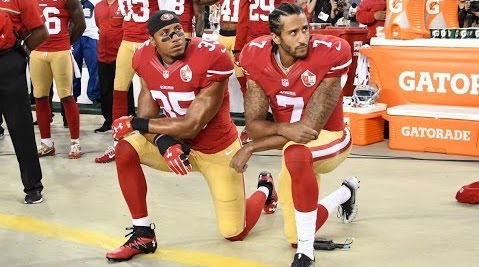Politics Belong In Sports

When 49ers quarterback Colin Kaepernick knelt during the national anthem, he started a controversial discussion on the intersection of politics and sports.
January 23, 2017
Last year, San Francisco 49ers quarterback Colin Kaepernick made headlines when he knelt during the customary performance of the U.S. national anthem before a game. Kaepernick claimed that he did so to protest the mistreatment of black people at the hands of the police and the government. The football player’s act sparked a national debate over whether sports and politics should intersect.
As it has become more apparent that the professional sports industry is plagued by the same issues of discrimination that characterized Donald Trump’s presidential campaign, political agendas and messages have begun to play a bigger role in U.S. professional sports.
In 2016, the U.S. Women’s National Team accused the United States Soccer Federation of paying the female team significantly less than their male counterparts, despite USWNT’s victory in the 2015 FIFA World Cup. In the complaint the team filed with the Equal Employment Opportunity Commission, the women’s team cited that it received $2 million for its win in 2015 whereas the men’s team received $9 million despite only reaching the 16th round of the 2014 World Cup.
The complaint also showed that while the women would receive a $75,000 bonus per player for first place, the men’s team would receive roughly $390,625 per player for winning first place.
While this gap is often justified by arguing that the women’s team brings in less revenue than the men’s team, USWNT clearly has the potential to attract more revenue. The final match of the 2015 FIFA Women’s World Cup, which reached 23 million viewers, was the most-watched soccer match in U.S. history. Rather than being a question of USWNT’s ability to bring in revenue, it’s instead a question of the public’s desire to support female teams the same way they support male teams. Yet, it is unfair that female players should be discriminated against so blatantly because of the public’s disinterest.
With such damning evidence, it would be impossible to separate the issue of sexism from this aspect of professional sports. The complaint made by USWNT shows how political movements can bleed into popular culture by revealing the prevalence of the desire for gender equality.
Homophobia has also had a constant presence throughout the U.S. professional sports industry.
A study done by Out of the Fields revealed that 84 percent of gay men and 82 percent of lesbians had heard homophobic slurs used in locker rooms. Although some argue that people do not always uses these slurs with homophobic intent in mind, derogatory comments make LGBTQ athletes more unwilling and afraid to come out to their teammates.
The only way to address these incidents of discrimination is to point it out, and as Kaepernick showed with his protest, social and political movements have been very effective at starting discussions that lead to change.
In 2015, the Cover the Athlete campaign sought to demonstrate the ridiculous ways that female athletes are treated by creating a video that parodied how male athletes would respond if asked the questions female athletes often hear. During the 2016 Summer Olympics, several publications and commentators were accused of covering female athletes in a sexist manner because they focused on the women’s personal lives and appearances instead of their performances. Movements like these have become increasingly prevalent in sports, with many major sports leagues and social movements even working together to point out and punish troubling behavior among athletes.
In April 2016, the NHL — pushed by the You Can Play Project, an organization co-founded by the NHL Safety Director to support LGBTQ athletes — suspended Andrew Shaw, the former Chicago Blackhawks forward, after Shaw was heard making homophobic slurs to the referee. This new precedent reflects the growth of the LGBTQ rights movement and its incorporation into all aspects of society, including sports.
Political statements made by athletes reflect the growth of social movements that have gained popularity in the U.S. By using their public status and popularity to spread political messages, athletes show the public that the same topics discussed at dinner tables, presidential debates and rallies are relevant to sports as well. Acts of protest are so important because they publicize that change is desired and needed in the sometimes insular sports community.
A version of this article appeared in the Monday, Jan. 23 print edition. Email Sierra Jackson at [email protected].


























































































































































